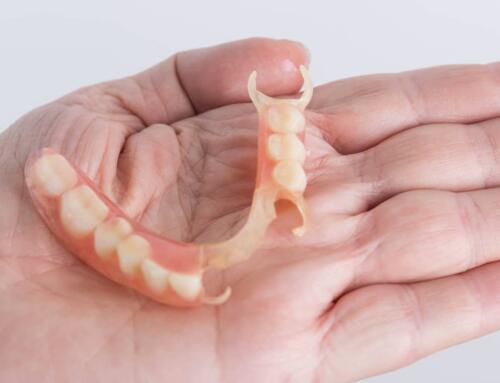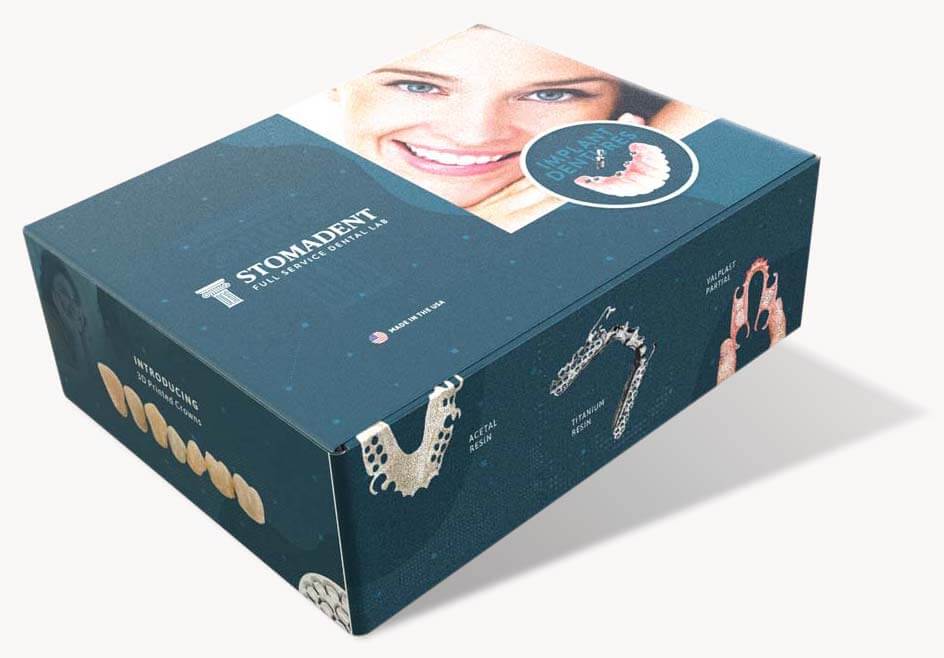
By David Hudnall, DMD
Metal Partials
Metal-Free & Flexible Partials
Types of Dentures
Dentures, in the simplest of terms, are one way to replace missing natural teeth. Within this broad category, there are two basic types of dentures: complete dentures and partial dentures. Complete dentures are used by the dentist when the patient is completely edentulous. Partial dentures are uniquely designed for each patient to replace only the teeth that are missing while utilizing the remaining natural teeth to support the appliance.
Types of Partial Dentures
Removable partial dentures are a cost-effective method for replacing missing teeth, restoring both form and function, and improving the patient’s self-confidence. Today, there are numerous materials to accomplish this goal. We will discuss types of partial dentures and the cost of partial dentures to dental professionals.
Stomadent Dental Lab is proud to provide the following types of partial dentures: Titanium Framework, Wironium Framework, Valplast Flexible, Acetal Resin, and Acrylic.
Titanium Framework Partial Denture
Denture Type
Why titanium? Titanium is the most biocompatible metal used in dentistry. Virtually no one is allergic to it. A removable partial denture framework made from titanium is roughly 400 percent lighter than most comparable cobalt/chromium alloys. This translates into vastly improved comfort for your patient.
Materials
The framework for this type of partial denture is manufactured via a proprietary CAD/CAM system that precisely mills a three-dimensional titanium framework from a void-free rectangular plate of the metal. This process eliminates labor-intensive steps that can introduce errors into the final appliance. The Titanium framework fits precisely upon delivery without the need to spend precious chairtime making adjustments.
Cost of Dentures
Stomadent offers the Titanium Milled Partial Denture Framework to dentists for $199 — an incredible bargain for a precisely-machined piece. Set up, processing, and finishing incurs additional fees, depending upon the denture base material and teeth that are selected to marry with the framework.
The cost to patients for a finished partial made with a titanium framework averages between $1,200 and $2,500, depending upon case complexity and your geographic location.
Benefits
The Titanium Framework Partial offers an exact fit and is the most durable of all of our offerings. A titanium framework is difficult to distort and is corrosion resistant, making this type of partial denture stand up well to the intended use and occasional abuse.
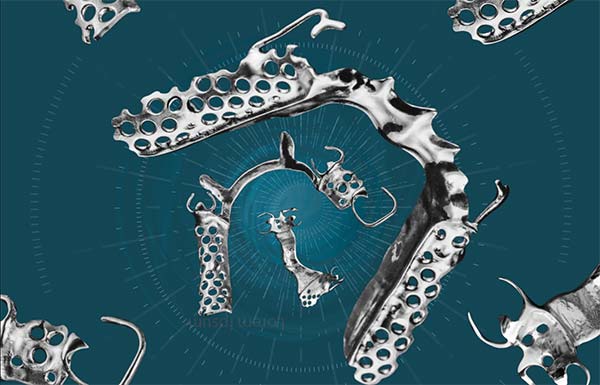
Starting at $218
Set up, processing, and finishing incur additional fees, depending on the denture base material and the teeth chosen to marry with the framework.
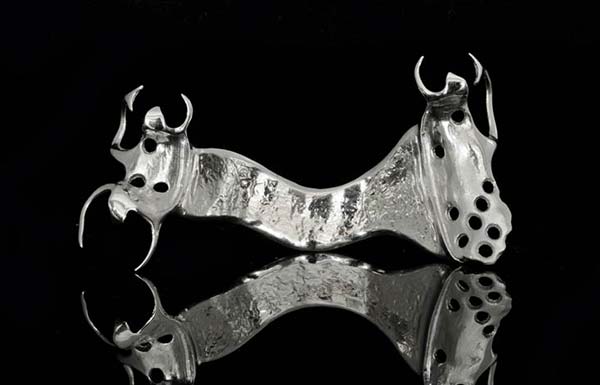
Starting at $195
Additional charges apply for setup, processing and finishing. Please see our Removable Fee Schedule brochure for additional details regarding pricing.
Wironium Framework Partial Denture
Denture Type
Wironium is a proprietary nickel-free, cobalt-chromium alloy. This type of partial denture is similar in composition to many other brands of cobalt-chrome alloys that have been available to the dental profession for the fabrication of cast metal partials for many years.
Materials
What’s unique about it? Small changes in the cobalt-chromium formulation yields an alloy framework that has a high resistance to deformation while, at the same time, being slightly flexible. The clasps resist fracture better than any other product available. These properties allow Wironium frameworks to be incredibly thin while also possessing great strength and durability.
Cost of Dentures
The cost of a partial denture made with Wironium starts at $178 for the framework only. Additional charges apply for setup, special clasps or retention, processing, and finishing. Please see our Removable Fee Schedule brochure for additional details regarding our pricing. The cost for a metal partial denture to patients ranges from $1,000 to $2,000 on average.
Benefits
The Wironium Framework Partial has a unique retention system of malleable clasps that conform to the tooth contour. The clasps engage correctly at delivery eliminating the need for excessive clasp modification at chairside and metal fatigue. Minor clasp adjustments may be made without the risk of breakage. Try that with any other metal alloy formulations. Experience the Wironium difference.
Valplast Flexible Partial Denture
Denture Type
Valplast partials are made from a thin, lightweight, thermoplastic material for precise tissue adaptation. They provide comfort for the wearer and offer improved aesthetics without the use of any unsightly wires or metal clasps. Greater tissue coverage is the source of their strength.
This material is a great choice as a Nesbit partial for replacing one or two missing teeth, for patients who have teeth present on both sides of edentulous areas, and for patients whose teeth are less stable due to periodontal disease or recession.
Materials
Valplast is manufactured from a combination of biocompatible nylon and thermoplastic resin. Since there are no tooth-supported occlusal rests, they rely on excellent adaptation to the underlying tissue for a precise fit. The clasps are adapted close to the gingiva and are also made from the same tissue-colored material.
Cost of Dentures
Stomadent is pleased to offer a complete Valplast Flexible Partial Denture for $346, including the teeth. Modifications or special requests are available at an additional charge. Please see our Fee Schedule for pricing details.
The average price to patients for a Valplast Partial Denture ranges from $800 to $1,500 per arch, depending on case complexity and geographic location. This price includes all of the additional work that the dentist must do to have the partial fabricated.
Benefits
In many cases, it is difficult to tell where a Valplast Partial ends and the natural teeth begin. Since the material is hypo-allergenic, this type of partial denture is suitable for patients with allergies to denture monomers or nickel.
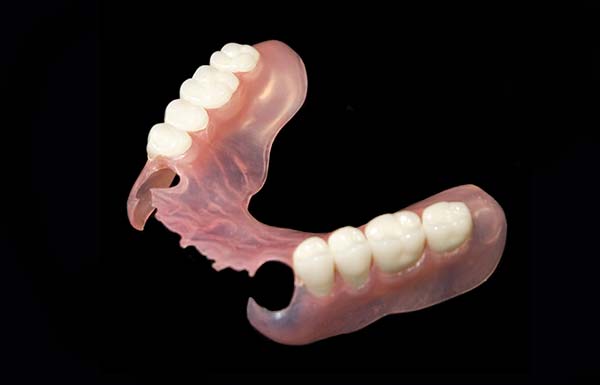
Complete Partial Denture for $380 (Including the teeth)
Modifications or special requests are available at an additional charge. Please see our Fee Schedule for pricing details.
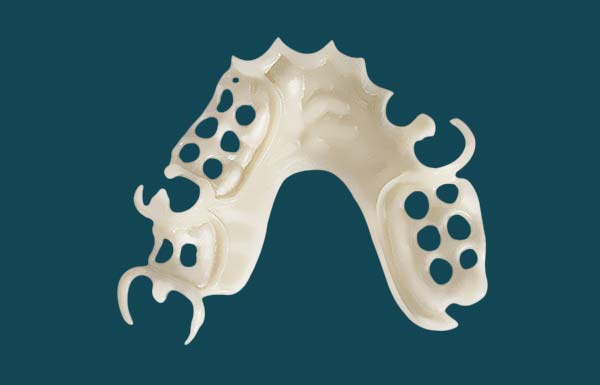
Starting at $218
(Framework Only)
Additional services are available for a nominal fee. Please see our Removable Fee Schedule for specific details.
Acetal Resin Semi-Flexible Partial Denture
Denture Type
Made from a hypo-allergenic polyacetal resin, Acetal Resin Partials literally disappear in the patient’s mouth. Acetal Partials have tooth-colored clasps that match the VITA shade guide. The clasps provide secure retention and disappear when the partial is inserted. No other partial offers this option. This feature allows Acetal Resin to “shine” by being invisible when other partials aren’t.
Materials
Acetal Resin provides both strength and semi-flexibility to the finished dental appliance. It is CAD/CAM milled for a comfortable fit, has excellent retention, and requires minimal adjustments. Its hypo-allergenic base minimizes tissue reactions and irritation. The elastic memory of Acetal Resin allows the clasps to cling deeply into the tooth’s undercut for added security.
Cost of Dentures
Stomadent’s price point for an Acetal Resin Partial Denture starts at $199 for the framework only. Additional services to make the partial complete can add $200 to $400 to the basic fee. Please see our Removable Fee Schedule for more details. Patients can expect the cost of an Acetal Resin Partial to range between $1650 and $3,000, on average, depending on factors such as geographic location and the complexity of the case.
Benefits
Acetal Resin Partials can be a great tooth replacement solution. And, it’s a reversible procedure. If the patient’s health or financial situation changes, the possibility for a more permanent treatment option in the future, such as dental implants, can easily become a reality. Acetal Resin is also an excellent transitional restoration solution during healing for implant cases.
Acrylic Removable Partial Dentures
Denture Type
All-acrylic removable partial dentures are made to be the most economical tooth replacement solution within the family of partial dentures. An Acrylic Partial is designed to be a temporary appliance that will eventually be replaced by a more permanent restoration.
Materials
Using a fabrication method composed of acrylic monomer and polymer that has been around for many decades, denture teeth are set into an acrylic baseplate. Wrought wire clasps may be incorporated into the acrylic base to help secure the partial to the abutment teeth. Digitally-designed Acrylic Partials offer an alternative to traditional Acrylic Partials by eliminating the release of toxic monomers while ensuring a precise fit.
Cost of Dentures
The dentist’s cost for an Acrylic Removable Flipper Partial Denture begins at $110, without clasps. Acrylic partials designed with clasps to replace more teeth range from $226 to $500, depending on the additional options selected. Please see Stomadent’s Fee Schedule for specific pricing information and additional options.
The cost of an Acrylic Partial Denture to patients averages between $695 and $1,200, depending upon case complexity and geographic location.
Benefits
An Acrylic Partial is the most economical type of removable tooth replacement option available. It is also the easiest to add to or modify in the future. This feature makes it suitable for use as transitional appliances where the structure that supports the partial will change with time.
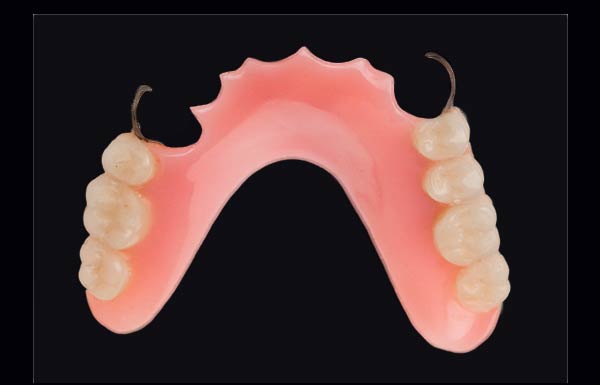
Starting at $226 (without clasps)
Please see Stomadent’s Fee Schedule for more specific pricing information and additional options.
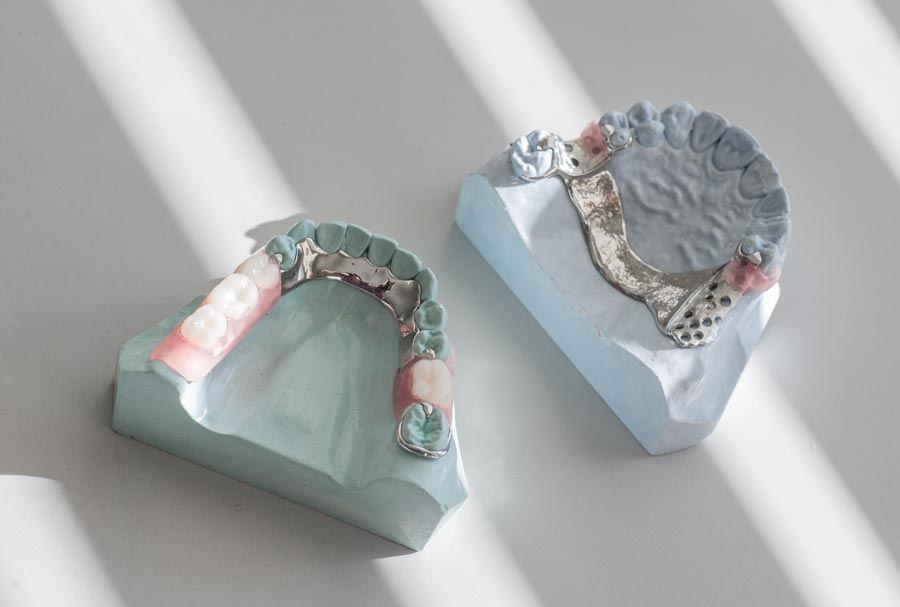
Additional services are available for a nominal fee. Please see our Removable Fee Schedule for specific details.
Hybrid Metal/Flexible Partial Denture
Denture Type
This type of partial denture is a Stomadent exclusive. We take the best attributes from our metal framework partials and combine them with the superior aesthetics and comfort of flexible partials.
Materials
It’s possible for us to fabricate a hybrid partial denture consisting of either a Titanium or Wironium framework with Acetal Resin clasps or Valplast elements in areas where hiding unsightly metal is critical. This removable partial is the best of all possibilities and provides the patient with a truly unique appliance made exclusively for their comfort.
Cost of Dentures
Because this partial is customized specifically for the individual patient — and there are many options involved depending on case complexity and geographic location — each hybrid partial carries a different cost to the dental provider. Please contact Stomadent directly for pricing details regarding your customized hybrid appliance case.
Benefits
We can use different materials in various combinations to achieve the most aesthetic result that your patient demands while providing the precise fit and strength of a cast metal framework that the dentist desires. This type of partial provides a service rarely offered by other dental laboratories.
How Should a Partial Denture Fit?
Patients often ask, “What’s the best partial denture?” or “How should a partial denture fit?”. The short answer is: it depends.
Comfort and aesthetics are often a matter of personal opinion. Different people have different ideas of how well something should fit and what is comfortable to them. The type of denture with a metal framework fits more precisely and offers better chewing efficiency than a partial made from a flexible material or acrylic. But some patients can’t tolerate a rigid partial framework.
Flexible partials are just that — flexible. They don’t have metal clasps. They are kind to the tissue, but the material can noticeably flex while chewing. This is good for aesthetics and comfort but doesn’t work so well when used to replace a long span of missing teeth or for a distal extension. Their retention is compromised when compared with the retention of a cast-metal partial. This trade-off for improved appearance can evoke a frustrating experience for former cast-metal partial wearers.
Partial Dentures versus Full Dentures
Natural teeth provide support and stability for partial dentures in ways that conventional complete dentures can’t. No matter how well a complete denture fits, it remains a less stable appliance than a partial denture. This is true as long as the patient maintains healthy abutment teeth located far enough apart to distribute the points of retention.
Ideally, for any partial, the natural teeth should be configured to allow triangulation to prevent rotation of the partial in function around any single fulcrum line. As the clinician, you must assess the patient’s needs, wants, and desires with what you believe will be the best partial denture option for them.
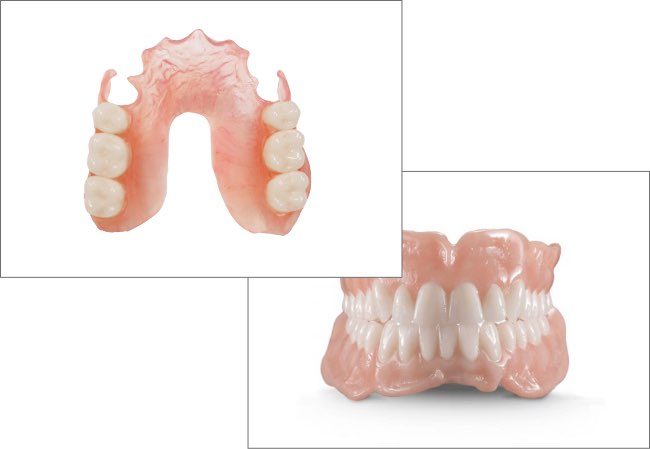
Stomadent Is Your Lab of Choice
Other dental laboratories outsource their work to Stomadent because they trust us to provide quality restorative products with consistent results at competitive prices. Why not do the same? Go directly to the source for superior removable dental appliances – Stomadent Dental Laboratory. We offer our experience, expertise, and the latest CAD/CAM technology directly to you. Why trust your patient’s comfort to anyone else?
For our current fee schedule to dental professionals, follow this link:

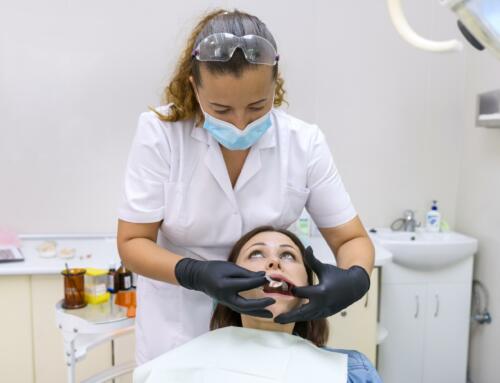
![Partial Denture Clasp Types [Assessing Clinical Situations]](https://stomadentlab.com/wp-content/uploads/2024/03/dental-implant-model-dental-bridge-in-hand-dentis-2023-11-27-05-11-13-utc-scaled-500x383.jpg)
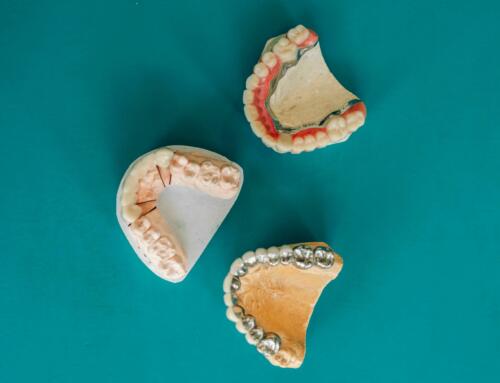

![Hybrid Denture with Titanium Bar [Best Methods + Advantages]](https://stomadentlab.com/wp-content/uploads/2024/01/dental-prosthesis-on-dark-background-2023-11-27-05-06-28-utc-scaled-500x383.jpg)
![TCS Flexible Partial vs Valplast [Comparing Denture Options]](https://stomadentlab.com/wp-content/uploads/2024/01/asian-elderly-woman-patient-use-toothbrush-to-clea-2023-11-27-05-03-35-utc-scaled-500x383.jpg)

